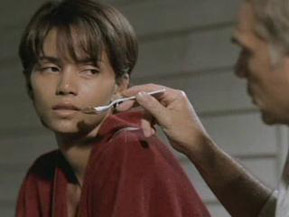Are You With Us?: Monster's Ball
By Ryan Mazie
March 11, 2013
What makes the film a critical (yet overrated) hit, holding at 85% on RottenTomatoes.com, is the stellar cast. There is not a weak performance in the bunch. Heath Ledger is excellent as the fatherly-love seeking son. Cast in the role at the last minute after Wes Bentley dropped out, Ledger makes the most out of his limited screen time. Sean "P. Diddy" Combs and first-and-last time child actor Coronji Calhoun make excellent headway too in roles that are cut off short by death. Boyle immediately sheds his comedic image in the racist father role, finding depth in what could have easily have been a one-note supporting role.
However, it is clear that Thorton and especially Berry own this movie.
Thorton is given the less showy of the lead roles, played with a stoic stance and short sentences. Berry runs the emotional gamut, shedding tears and glowering in anger, sometimes in the same scene. Bringing stability to a character that could easily go into the territory of mad woman in the hands of a lesser actress, Berry gives her all (and shows all – something that made Vanessa Williams turn down the part) and has been awarded handsomely.
While I said I think the film has been overblown in terms of quality over the years (the fairly low IMDb rating of a 7.1 for an awards season film goes to show there is some dissent), the performances still stand.
One of the biggest benefactors from Monster’s Ball’s success was first-time theatrical-release director Foster, who got offered much bigger opportunities afterward. Ledger also got to showcase his more dark and dramatic side in his still burgeoning filmography. Thorton and Berry were already established by the time the film’s release, with Monster's Ball adding more acclaim to their awards repertoire. Berry’s historic Oscar win arguably brought her career to an even higher level, one that took a sharp dive three years later with the release of Catwoman along with other flops and some straight-to-DVD affairs. Her inability of not being able to live up to her Oscar gold has become comedic fodder.
Released by Lionsgate (when they used to release quality independent films, before becoming the house that Saw and Tyler Perry built), Monster's Ball quickly became their highest grosser and put them on the map.
Opening the last weekend of December to qualify for the Oscars, it wasn’t until the second weekend of February that the film opened into a significant number of theaters (342 locations). Never reaching the top 10, Monster’s Ball quietly added to its total throughout the awards season, playing in over 300 theaters even in May. When all was calculated, Monster’s Ball earned a very respectable $31.3 million ($44.5 million today) against a budget of $4 million.
While the film garnered controversy about its racist characters and the idea of a black woman needing a “white savior”, I did not find any of these elements offensive. Much like the ire surrounding last year’s Django Unchained, these elements aren’t glamorized but dissected. While not as subtle as it thinks, Monster's Ball examines racism and peels it back.
A slow-burn drama, this modern sticky southern gothic film is compelling if you can get past the initial stages. Not a perfect plot, Monster’s Ball is a master’s class in acting, seeing performers rise above complicated roles instead of being crushed by them.
Verdict: With Us
7 out of 10
Continued:
1
2
|
|
|
|




